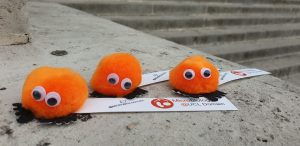
Welcome to our blog for the LittleSTEMS Microbiology Outreach and Training project. This is where we are documenting our school outreach activities in microbiology and what our UCL microbiologists and students have learned through the process.
This project was conceived in 2019 and represents an ongoing collaboaration between the Microbiology@UCL Domain, UCL Innovation & Enterprise, UCL Institute of Education, and the Little STEMs initiative.
We were finally able to deliver our microbiology learning activities to schoolchildren for the first time in June-July 2021, after a year delay due to the COVID-19 pandemic. Delivery consisted of a hybrid model over 6 weeks, with microbiology and education experts from UCL interacting with Year 5 schoolchildren (ages 10-11) and teachers remotely via Teams, with one face-to-face visit to the school.
Stay tuned to further posts to learn more about how it went and what we learned.
Project Description
This project aims to enhance education in microbiology and public health science through the mutually beneficial experience of school outreach. UCL postgraduate students, UCL staff, and local primary schools will be brought together to co-design and co-deliver hands-on educational activities for Year 5/6 schoolchildren in disadvantaged areas of London. To leverage engagement and impact, the classroom activities will focus on timely topics in microbiology including vaccines, hand hygiene, and beneficial microbes. UCL students are concurrently trained in science communication and teachers will gain confidence and skills in teaching difficult concepts.
Objectives
- Enhance children’s understanding of and engagement with microbiology concepts and the scientific method by using enquiry-based learning, which leverages their natural curiosity and highly relevant current events due to the COVID-19 pandemic.
- Training for UCL students and staff in communication of timely microbiological concepts to broad audiences, thereby better equipping them with essential translational skills for a wide range of careers.
- Training and confidence building in effective implementation of the science curriculum for primary school teachers.
- Formation of knowledge transfer routes and solidification of partnerships between UCL researchers and the primary school sector.
- Assess learning outcomes, success, and feasibility, for both schoolchildren and UCL postgraduate students such that the learning activities designed in this project can be effectively continued/maintained/expanded in future with additional cohorts of schoolchildren and UCL students/staff.
Acknowledgements
Many thanks to the following people and organisations, without whom this work would not be possible:
- James Jennings and UCL Innovation & Enterprise
- Amanda McCrory and UCL Institute of Education
- Joanne Santini and Microbiology@UCL Domain
- LittleSTEMs initiative
- Aveley Primary School
- Marco Crisci (UCL student)
- Praveena Senthilkumar (UCL student)
- Lucy van Dorp
- Stephen Morris
A special thanks to UCL’s Community Enganged Learning for their financial support and encouragement to broaden the impact of this project more widely across UCL.

